
|

Dulani and Roger as Vijaya and Kuveni |
Dulani reigns as Kuveni
Amalshan GUNERATHNE
Not many have gained instant success at the highest level of acting
as she has. Showcasing her versatile talents and gaining immense
critical acclaim for her first-ever performance on the silver screen,
she captured many hearts through her role in Jackson Anthony’s cinematic
venture ‘Aba’.
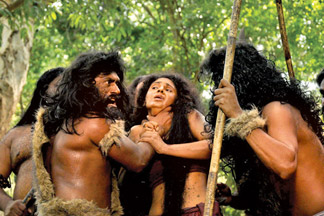
Kuveni being attacked by the Yakka tribe members |
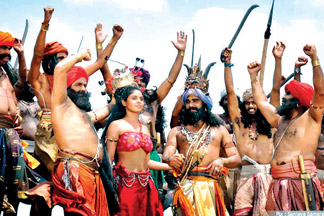
Vijaya and Kuveni surrounded by their
army in a moment of victory |
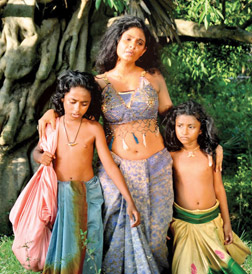
Kuveni and her children
flee from Vijaya’s clan |
| |
Stepping into an unknown territory as a newcomer, she surprised many
with her strong performance and went on to win the Best Actress Award at
the Sarasaviya Film Awards.
Her second appearance also comes in a film of similar magnitude.
Portraying the role of the legendary Kuveni, she is back with yet
another arresting wide screen performance that could put her in
contention for another award. Multi-talented Dulani Anuradha discussed
her formula of success in Sugath Samarakoon’s ‘Vijaya Kuveni’ which is
unspooling in cinemas these days.
Q: How challenging was it to portray a tough character like ‘Kuveni’?
A: Kuveni ends up being a tough person only because of her
upbringing and the difficulties that she had to undergo. Yet deep down,
she is a soft-hearted person with genuine feminine emotions. Portraying
those varied emotions of Kuveni’s character made it a very demanding and
challenging role for me. We always try our best to do full justice to
whatever roles that we get but it is up to the viewers to decide whether
we are successful or not.
Q: You have acted in two major big-budget films: ‘Aba’ and
‘Vijaya Kuveni’. Could you share your experiences about the workload and
the effort that are put in to make such projects?
A: Both ‘Aba’ and ‘Vijaya Kuveni’ are grand projects. I was
fortunate that my first film was such a magnificent project. Working on
such a movie is a huge process. The director and the crew had to put in
a tremendous effort to see that all the aspects are in place to make it
work.
Everything has to be captured meticulously. Special attention was
given to costumes and make-up. The fight scenes were very detailed.
There was a strong bond between the cast and crew. If not for that bond,
it would have been difficult to make it work. Both films were done after
doing extreme research.
Both Anthony and Samarakoon have put in lots of effort and thought
into the productions. They started working on it years before filming
started.
Q: Starting from ‘Aba’, many films were made in recent-times
which revolve around historical themes. Do you see it as a trend? Do you
feel that there is enough variety in the current cinema trends to
sustain the viewer-ship?
A: Yes, it is an obvious trend. But I don’t think people are
still fed-up of it. The interest is still there. The appetite towards
such historical films has not died down. As long as directors and actors
do a good job, there will be an audience.
Cinema is a visual medium. If the director and cast can make full use
of the visual medium and come up with strong and arresting creations the
viewers will still like it. Having said that, everything dies down with
time, like in fashion industry where certain trends last for a
particular period and diminishes with time.
|
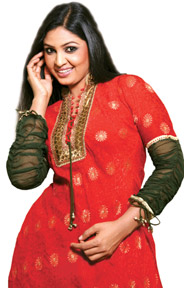
Dulani Anuradha. Picture by Tennyson Edirisinghe |
Q: You were able to work alongside some of the greats in local
cinema industry at the very early stages of your acting career. How much
did that help you to progress as an actress?
A: Working alongside some of the thespians in the cinema field
has been a great opportunity for me. When I was doing ‘Aba’, seniors
like Ravindra Randeniya, Sabeetha Perera and Malini Fonseka were there
to guide me. I had lot to learn from them and how they go about doing
their work.
Even during ‘Vijaya Kuveni’, I got the chance to act alongside Roger
Senevirathne, Cletus Mendis and Buddhadasa Vithanachchi. They helped to
harness my acting talents.
Q: Within a short-span of time, you were able to win great
critical acclaim and fan support for your performances in cinema, how
was your initial upbringing and your acting background?
A: I am still very new to the film industry. I didn’t have any
experience at all when I first burst in to the scene. I have studied
dancing in university and I have acted in some stage-dramas during
school days but that was it.
So when I first came to the scene, Jackson Anthony made me rehearse
continuously. He was searching for the right actress to portray the main
role for so long that he wanted to get it perfect. I had to go through
varied acting exercises because he wanted to make sure that I have the
acting capacity to portray the varied emotions that were expected of my
character.
Q: So far viewers have only seen you perform similar type of
roles in similar genre of movies in ‘Aba’ and ‘Vijaya Kuveni’. Don’t you
think that such prejudices would restrict your acting scope?
|
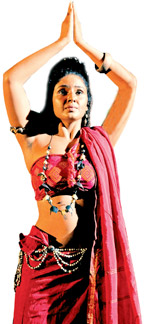
Dulani as Kuveni |
A: No, I have portrayed varied roles in other films, but those
films have not been released yet. After ‘Aba’ I did two films called
‘Sangili’ and ‘Paravarthna’. Both films are yet to be released. I don’t
like to restrict myself to particular type of roles. For instance, after
I played ‘Pabalu’s role in the ‘Vahinna Muthu Vassak’ teledrama, I got
invitations to act in similar type of roles. I refused them. I like to
have a sense of variety in my work.
Q: You have acted in few teledramas as well. Share your
thoughts on current teledrama trends.
A: People consider lengthy teledramas as a threat but the
problem is not in length of the teledrama. We used to love long
teledramas such as ‘Duduruwo’, ‘Nedayo’ and ‘Oshin’.
It is a matter about whether the drama has the capacity to arouse the
curiosity of the viewers and keep their interest levels going for a
longer span. If they make teledramas with interesting storylines, people
will still watch it.
Q: How do you select your roles?
A: I only take on one or two projects per year. Initially it
all depends on the script. When you read the script, a certain idea gets
to your head about the role that you are expected to perform.
It all depends on how it touches you. If the script is strong enough
to capture people’s heart, I go for it. You also have to think about
your role. Sometimes we get flawed scripts with strong characters in it.
SAARC unites filmmakers
Ishara JAYAWARDANE
The SAARC Film Festival 2012 kicked off in grand style and unfurled
at the National Film Corporation from May 16 to 20. This was the second
SAARC Film Festival to be held in the city. It showcased feature films
and documentary films from Bangladesh, India, Maldives, Pakistan and Sri
Lanka.

Director K P Suveeran receives a Bronze Medal for the feature
film
‘Biyari’ from India. Pictures by Sulochana Gamage |
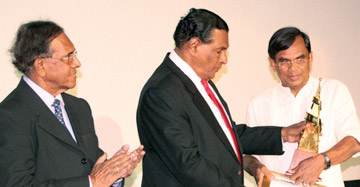
NFC Chairman Asoka Serasinghe receives the award for
Best Feature Film ‘Akasa Kusum’ from Sri Lanka |
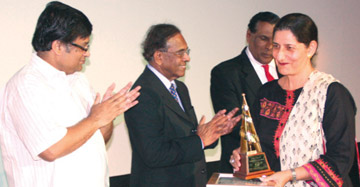
Pakistani High Commissioner Seema Illahi Baloch collecting the
Award for Best Documentary Film ‘Saving Face’. SAARC Cultural
Centre director G L W Samarasinghe is also in the picture with
Bangladeshi High Commissioner Mahabub Uz Zaman |
“The SAARC Cultural Centre has been dedicated to promote distinctive
arts in South Asia with the aim of bringing the people of South Asia
closer through the crucial role of culture. South Asian countries are
rich in cultural heritage and the SAARC Film Festival, organized by
SAARC Cultural Centre, is one of the major cultural events to promote
relations and understanding amongst the member states of SAARC,” SAARC
Cultural Centre director G L W Samarasinghe stated at the festival
inauguration.
Mass Media and Information Acting Minister and Economic Development
Deputy Minister Lakshman Yapa Abeywardana who was also the chief guest
of the event said that it is a pleasure to welcome cinematic
personalities from the SAARC members.
“Culture and the Arts play an important role in the SAARC region. It
is one of the most diverse regions in the world. SAARC film festival is
also a means of recognizing and appreciating the diverse culture of the
region and bringing the people of South Asia closer together,” he said.
Public Administration and Home Affairs Minister W D J Seneviratne was
the Chief Guest at the SAARC Film Festival Award ceremony which was held
on May 20. The Best Documentary Film award went to ‘Saving Face’ from
Pakistan, directed by Daniel Junge and Sharmee Obaid Chinoy, for its
brave exposition of a deep social problem about violence against women,
and its shocking footage of both victims and perpetrators. An honourable
mention was made of ‘The Great School Teacher’ from Sri Lanka, directed
by Mayuri Wanaguru.
The Best Feature Film title was won by ‘Akasa Kusum’, from Sri Lanka,
directed by Prasanna Vithanage, for its poetic evocation of a golden age
of cinema, seen through the memories of love and loss of an ageing
actress. The Silver Medal for the Best Feature Film was given to
Pakistan for ‘Ram Chand Pakistani’, directed by Mehreen Jabbar, and the
Bronze Medal for the Best Feature Film was given to ‘Biyari’, directed
by K P Suveeran.
Certificates of Recognition were given to Morshedul Islam as Best
Director and for the film ‘Khelaghor’ from Bangladesh. The Best Actor
titles went to Manzar Sehbai and Rashid Farooqi for their roles in ‘Bol’
and ‘Ram Chand Pakistani’ and the Best Actress was Malini Fonseka for
her role in ‘Akasa Kusum’. The Special Jury Certificate of Recognition
went to Asoka Handagama for ‘Vidhu’.
|

Aruni and Roshan in ‘Supersix' |
‘Super Six’ smashes records on first week
Naking the box office by storm Udara Palliyaguruge’s maiden movie
‘Super Six’ brought in a whopping Rs 10.5 million in sales during its
first week of screening. This figure ranks among the best achieved
amount to date in Sinhala commercial cinema history.
The movie which stars Roshan Ranawana, Aruni Rajapaksa, Hemal
Ranasinghe, Saranga Dissasekara, Pabodha Sandeepani and Mahika
Sirisenage in lead roles premiered on May 17. Produced by R Sadesh Kumar
and Srimathi Sadesh Kumar the movie scored another first by being
simultaneously released in Sri Lanka and India with the latter being
subtitled in Hindi.
The movie is also the highest budget Sinhala movie with Rs 99 million
spent on its production alone. It has a cast of around 10 and was shot
in Sri Lanka, India, Malaysia and the Andaman Islands. The movie is
screening at Liberty cinema and other EAP theatres islandwide.
Liberty Lite celebrates first year anniversary
Liberty Lite cinema completed one year recently with a small
get-together at the premises. Movie Works (Pvt) Ltd managing director
Anura Priyantha Jasenthuliyana, and partner of the cinema Palitha Perera
took part in the event. The theatre opened its doors to movie buffs on
May 13, 2011, by screening ‘Fast 5’. |



